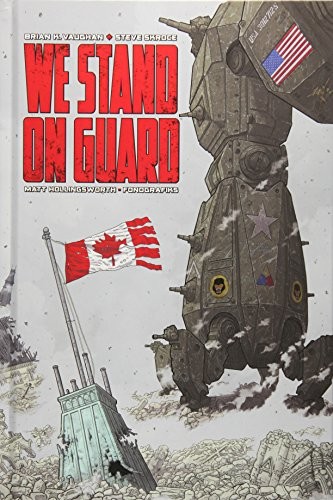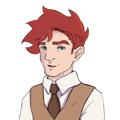2025 review
1 star
Looking for giant mechs, military action, red heads, and science fiction?
I picked this book up several months ago now because at the time Trump had just been reelected and immediately started talking about absorbing Canada and more then one person in my life suggested I pick it up. of course at this point, finally putting fingers to keyboard, Trump's comments continue and now he's sending the marines into LA to subdue civilians. What does the future hold? Who knows... although certainly not the scenarios in this book. But more on that later.
Content notes for blood and guts, mass civilian casualties, harm to animals, nudity and prison camps. Image doesn't rate their comics but there is a lot of blood and guts. Also consider if you want to see so called canada being bombed before picking up this book.
The publisher's summary is "Set one hundred years in our …
Looking for giant mechs, military action, red heads, and science fiction?
I picked this book up several months ago now because at the time Trump had just been reelected and immediately started talking about absorbing Canada and more then one person in my life suggested I pick it up. of course at this point, finally putting fingers to keyboard, Trump's comments continue and now he's sending the marines into LA to subdue civilians. What does the future hold? Who knows... although certainly not the scenarios in this book. But more on that later.
Content notes for blood and guts, mass civilian casualties, harm to animals, nudity and prison camps. Image doesn't rate their comics but there is a lot of blood and guts. Also consider if you want to see so called canada being bombed before picking up this book.
The publisher's summary is "Set one hundred years in our future, WE STAND ON GUARD follows a heroic band of Canadian civilians turned freedom fighters who must defend their homeland from invasion by a technologically superior opponent... the United States of America."
But before we dive into the writing side of things I did want to comment on my feelings on the title. For people not in the know, the book opens with a page of text rendition of Oh Canada, which is our national anthem. Being an anti-patriot I don't like it. Which is not a huge deal when it comes to a random american comic but it is a phrase that some people use to signal they are not a conservative but they also love so called canada or whatever. There was a brief period where I didn't think about this phrase at all for a while and then I saw a random sticker out in the wild with a canadian flag and we stand on guard and my initial reaction was to say f that because I assumed it was anti immigrant bs. Was I wrong? I'm assuming so at this point but I can't understand how people can find it anything but threatening.
But focusing in on the book at hand and the apparently award winning writing... I don't like it much either. Although that's not entirely Vaughan's fault as the feelings I have, closing this book come from a multitude of directions. But I will try and outline them as best I can to try and be as fair as possible.
Firstly, as with all of my reviews, no matter when the original work was written I am reading the book now and it's a bit silly to completely ignore that context. And at this point in time I am the most concerned I have ever been about the possibility of so called canada being militarily invaded by the so called united states. Is this concern warranted? Canadians I talk to are overall more concerned about this then the americans I talk to. Did the creative team ever think this would be a possibility when they wrote this story?
In a Comics Beat interview from 2016 Brian K Vaughan said "Despite the sci-fi premise, we wanted the book to tackle asymmetrical warfare in a relatively realistic way, and you can't have guerrilla combat without significant losses on all sides... Niko Henrichon and I had already done an allegory about noncombatant victims of war with Pride of Baghdad, but now I wanted to write about actual violent resistance against a country I love, in a way that would hopefully be relatable to anyone, regardless of nationality. Steve and I never wanted this to be boring 'commentary,' but underneath the pulp and giant robot guts, it’s definitely political."
And while I do think it's important to break the exceptionalism bubble white canadians in particular have been living in that they could never be on the receiving end of the kind of military violence that the united states has inflicted across the globe. I really wish they had toned down all the cliches and stereotypes. I mean, I get they were trying to be pulpy, but now we have the gory death of civilians in Ottawa, victims of a pre-emptive strike, in a cartoon. In the context of 2025 the juxtaposition just doesn't sit well with me, if it ever would have. But maybe I'm being too serious. It's hard to tell.
And there are futuristic dystopias older then We Stand On Guard that people still point to as scarily relevant. Octavia Butler's Parable of the Sower and the Talents comes most prominently to mind. Certainly less pulpy, but still very sci-fi.
But maybe Vaughan and the team needed the cliches and absurdity of pulp in order to talk about the idea of so called america invading so called canada for their water. It's a really dark topic and being faced with the reality of it, for better or worse with no giant robots in sight, is harrowing.
I am also skeptical that canadians could mount any kind of gorilla resistance but again, in my experience, most people do need a certain level of heroic rose tinted glasses to face dystopian realities.
My initial bio of Vaughan can be found in my review of the first volume of [[Y_ The Last Man Volume 01 Review]]. Link in the cards.
Looking at the art side of thing this book does credit both an artist and a colorist so I'll try and highlight these two angles well.
Continuing with the critical vibes let's start with the colors first because the colors of this book really rendered it pretty flat looking in my humble opinion. This seems to be a combination of the grey distinct lack of saturation overall and that while there are some examples of line and color being used to offer detail and depth, the complete lack of both for many elements of the book rendered it very disassociated. The guts in particular felt very cartoonish and flat. Is this a coping mechanism? Is this supposed to make it stand out? I just found it very hard to take seriously in any sense of the word.
Colorist Matt Hollingsworth is apparently technically new to the channel. Because while he did help launch Preacher Volume One. A book I've now read twice, i don't currently have a live review for it.
Initially born in California, Hollingsworth has apparently lived in Croatia since 2006 with his wife and son. He's also apparently done a little bit of everything from writing to drawing to texture painting in the film industry, and last but not least brewing beer. Perhaps unsurprisingly Hollingsworth opens the about section on his website with the fact that he is neurodivergent.
But looking at all other parts visual... Professional and serviceable certainly. The page layouts are varied but easy to follow. The character designs felt pretty basic, but in a way that played well with how each person is an archetype without descending into total cartoonery. Perhaps because of my own particular background I did take issue with the character design of Amber, the character we follow the most closely throughout. A child who survives the pre-emptive strike with her brother, despite all the fleeing and hiding and living on the lamb she apparently grows up to be a curvy hour glass red head without a single scar. Of course all the women we see in We Stand on Guard are cut from the same cookie cutter mold, but with Amber it just felt they took a few more turns to up the idealization meter. She is not a real person.
Completely new to the channel artist and co-creator Steve Skroce has apparently done (among many other things) an incredible amount of work with the Wachowskis including storyboarding for the Matrix, V for Vendetta (which I've also reviewed), Speed Racer, Ninja Assassin, Cloud Atlas and Jupiter Ascending in addition to co-creating and drawing Doc Frankenstein, a comic which is written by the Wachowskis as well. And in an interesting twist, Skroce is of Croatian descent but lives in Canada.
And last but not least Fonografiks is credited with lettering and design. According to canny comic con Fonograpfiks equals Steven Finch.
Looking at the themes, intersecting identities and elements I like to examine in each book I review:
Place is probably the thing most central to the premise of We Stand on Guard.
Class seems like it comes in second I suppose although obviously taking place in a time of war and mostly dealing with combatants, which is not the usual framing for my understanding of class war.
Race is probably third, though it was not really explored much. Citizenship is the major characteristic of our characters, followed by cultures. Although they do seem to limit themselves to cultural archetypes that they feel like they can get away with. So the Black characters escape largely unscathed, but we have an Indigenous and Québécois characters TM lol.
Similarly, while this comic seems to be restricting itself to just two genders there is a fair amount of both archetypes present. And there's one gay man. Which takes me to the stupidest part of We Stand on Guard. Namely the part where we get an eyeful of adult Amber naked (from behind) in the shower. Next frame a large Coywolf named Hungry scares her out of the shower and right into the view of his owner Les LePage, much to Amber's embarrassment as she scrambles to cover herself with a small piece of fabric. But he's no creep, he's gay and just checking her for any signs that she's been bugged.
Of course this sort of none consensual nudity in comics is one of the first things that I decided to confront when I started this channel. Because I think it's really weird to create female characters who generally don't want to get naked for a variety of reasons and find a way to get her naked either for just the audience (why is the internal monologue exposition happening in the shower or the bedroom?) or for both the audience and some (generally male) character. Like sure, conflict is great for a story, but you could also just make female characters who are actually not embarrassed by people seeing them naked and/or otherwise in a scenario where they have consented for the other characters in the scene to see them naked.
Fairly predictably, everyone in the book is seen as perfectly able bodied or dead (at least as far as I remember). There is practically no body shape diversity, especially when it comes to the ladies. Insert eye roll here.
Wrapping things up I'm just going to go for it. I didn't like this book so one star it is. Is it the worst book ever, no. Would I have been less bothered by this book if I didn't feel america might invade canada, maybe. Do I continue to question Brian K Vaughan's feminist credentials, yes. But I realize I'm in the minority with that one.

